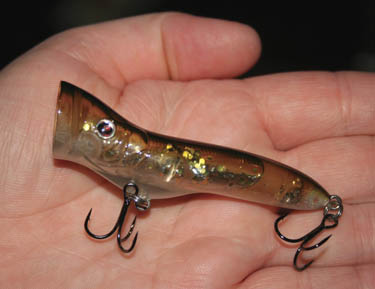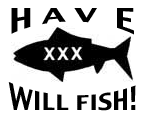
The Saltwater Magazine for Gulf Coast Fishing!
Search Gulf Coast Fisherman's
Web Site
Past articles, specific
places or fish, etc.

Chugging for Trout
by Chester Moore, Jr.
![]()
| CURRENT
MOON lunar phases |

"We're not bass fishing Chester."
That was the reaction I got last winter when some friends of mine and I decided to go catch some winter trout on West Galveston Bay.
"Chuggers are for old guys."
"Get with the times."
I heard it all that morning but soon their words were silenced by the beautiful "sploosh" of a speck sucking under my chugger, a custom plug called the Pop-N-Run.
I didn't out fish all of my friends using walkers that day but I did manage to get a higher blow-up to land ratio.
Back when I first started fishing heavily with topwaters, I was given some Rattlin' Chug Bugs to test and had great success. Since that time, I started fishing walking plugs like the Skitter Walk and She Dog much more but recently I have found myself getting back to chuggers, particularly during winter.
Chuggers are highly underrated for catching big trout and during the winter, their more leisurely pace loud "sploosh" can grab the attention of big sows in the bays. That is why I got a better blowup to hookup ratio on the day described above.
We often think of fish as voracious predators that cannot wait to get their mouths on whatever bait or lure we offer them. Reality is much different. We must remember that fish are cold-blooded and water temperatures dictate how they feed and respond to lures.
During winter on the Gulf Coast, water temperatures can run anywhere from the upper 40s to the upper 60s. In a short time span, that is great fluctuation and it can become a challenge for anglers to catch speckled trout. With that in mind, I believe anglers should stick to fishing lures as slow as they can. Even when the water temperature is up, it will allow them to score as trout and other predators are programmed genetically to take the easiest prey items, and one that is moving slowly is the most likely to get hit.
Many angler rush to tie on their walking plugs to experience the glorious "blowup" of a big speck. They are certainly effective, but I believe anglers should fish them slower than they normally do. I have been experimenting with fishing with chuggers and have had good success by fishing as slowly as possible.
During winter, I start by using the following pattern:
Cast. Chug. Wait five seconds. Chug again.
Then if that doesn't work, use the same pattern but wait only three seconds. It is difficult to fish this way, since it is a lot more fun to make a topwater move fast, but crawling it along can be super effective.
Start fishing your plugs with a slow retrieve and increase gradually. Never fish as fast as you would in summer or fall. Even on warm days, trout are not as active as they are during those warmer periods. Despite this relatively inactivity, some of the best trout of the year are caught.
"A chugger makes you fish a little slower," said noted wildlife photographer and avid angler Gerald Burleigh.
"I have been using them for years for largemouth bass and always caught really really nice fish often when others were missing them or getting short strikes. Then I started using them for trout and doing better than I did on walkers, at least for the larger fish."
Burleigh compares big sow specks to Florida largemouth bass and believes if anglers studied this strain of largemouths a bit they would get a better perspective on big trout.
"I have ponds stocked with Florida bass on my property and the first thing you learn is the more Florida's you have the less fish you are going to catch. Sure, they will get bigger but part of their genetics is they simply do not bite as much which is probably why they get bigger: less are taken from the population."
"When you translate that to big trout, you are getting to the top of the gene pool. The big ones that made it to trophy size got there for a reason and I believe part of it is they are programmed not to bite as much as their counterparts do. A chugger more naturally mimics what a wounded baitfish would be doing in cold months which is why I like fishing them," Burleigh said.
I agree wholeheartedly with this principle and find the parallels to largemouth bass fishing dead on, especially in regards to genetics. The Texas Parks & Wildlife Department for years been tinkering with genetics to create a strain of largemouths that would more readily bite angler's lures and baits for stocking in urban community lakes. They know Florida's get lockjaw soon in life and I believe there is a dividing line on trout from a genetic perspective to simply be more cautious. I don't think most fish "learn" with age as studies have shown their memories are very short, however, genetic programming could be the answer to why certain fish get big and others don't. I do not think it is all growth genes although that is certainly part of it, but also a caution gene that makes them less likely to end up hooked.
With that said, looking into this issue has strengthened my theory that chuggers are overlooked and could perhaps lead to far more trophy trout caught by anglers, particularly those less skilled at using walking plugs. Let's face it, not everyone can properly "walk the dog" but anyone can fish a chugger.
I like to use them on super lines like Berkley Fireline or Spider Wire because my style of hookset involves no true hookset. We miss many trout because as soon as we see the blowup we rare back, trying to set the hook with only water in way of the hooks. In reality, most blowups are misses and we get the fish on the second or maybe third strike, so give the fish some time. I had to learn this lesson back in the 1990s while fishing in the Chandeleur Islands and getting only 1/3 of the fish that blew up on the Top Dog I was fishing. The guys I was fishing with were very patient anglers and simply let the fish hook themselves and started reeling in when they did.
With a super line with no stretch, you can do this easily. I let the fish strike and when it starts to run with the plug, I steadily raise my rod tip and start reeling in and rarely miss fish when I do so. When there is no stretch in the line, there is no give and therefore hooks go where they need to go.
Besides knowing how to fish topwaters in the winter, an equally important element is locating mullet. After all, topwaters mimic mullet.
While some anglers might get the idea that it is necessary to find large concentrations of the popular forage species, perceptive anglers know small pockets lead to more success. An easy way to find them and the trout is to watch the tide charts and fish days where the tides are running high in the afternoon, and fish mud flats nearby deep water adjacent to spots like the Intracoastal Waterway. Black mud in the clear water warms quickly and draws baitfishes and their predators from nearby deep-water haunts. Additionally, the warmer water kick-starts the metabolism of specks and gets them feeding more aggressively.
Keep in mind, chuggers are not only effective during winter but they can also work wonders during the dog days of summer. Yes, water temperatures are higher, but there is another factor in the metabolism of fish: dissolved oxygen. Super high water temperatures mean low levels of dissolved oxygen, and that can really put the hurt on your fishing.
Have you ever wondered why trout in some of your favorite locations become difficult to catch during summer? It is because dissolved oxygen levels cause them to move slowly and actually puts their lives at risk. This is especially true for the mature, trophy-sized fish that we all wish to catch.
The key any time of year is to use pattern casting to eliminate non-productive water. More often than not, there will be certain pockets or hot zones the fish prefer. Many times, it will be a small clump of shell or a transition zone from deep to shallow.
If you start seeing signs of trout feeding or hear the familiar "gulp!" of a big sow sucking under a mullet, tie on a chugger and get ready.
Your fishing destiny awaits you.

